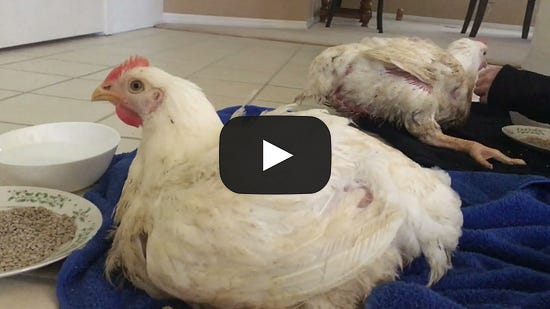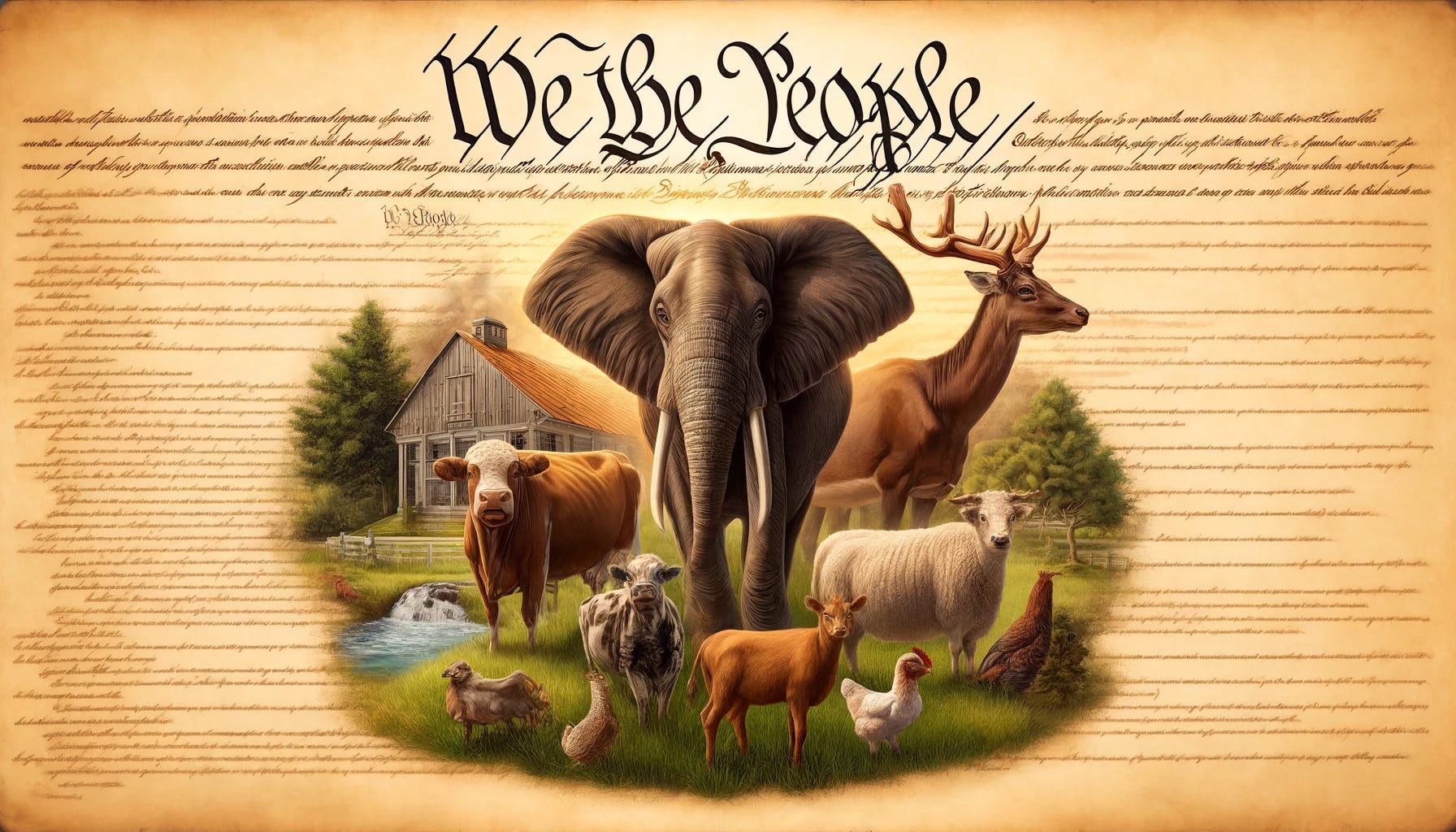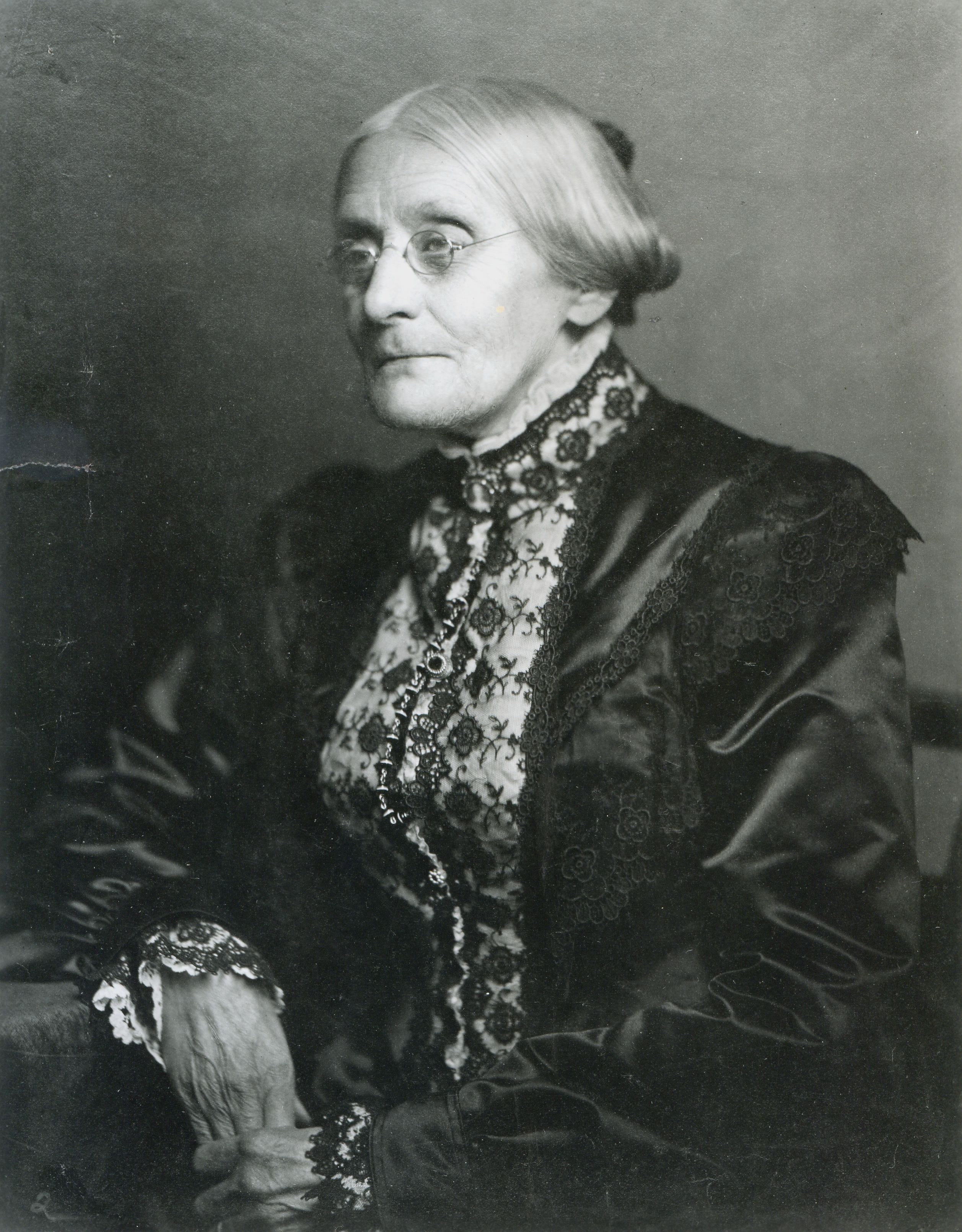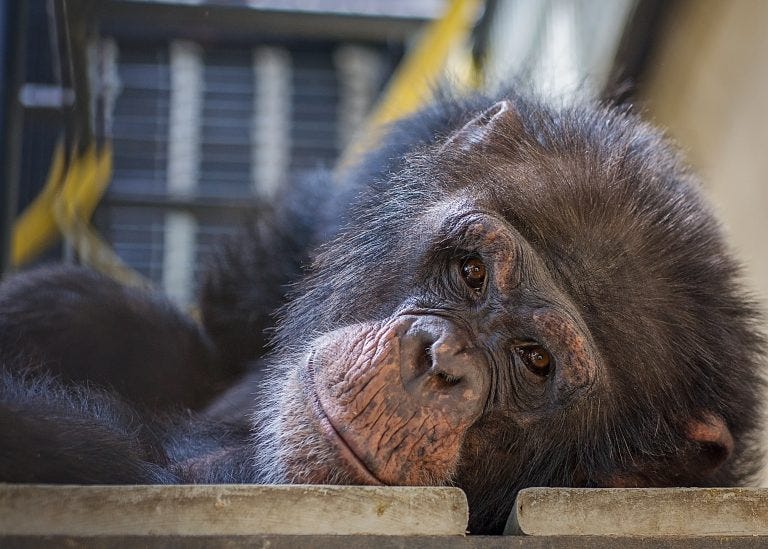|
One Word in the Constitution Could Free Billions of Animals
And the path to changing it is far easier than most think: constitutionalize your activism.
Change for animals often seems hard, especially in the law. Perhaps the only universally accepted fact in animal law is that there are great deficiencies in the legal protections against cruelty.
But this is wrong.
There is a single word that, if properly understood, would transform the legal status of animals and free billions from torment: Person. This word’s use and misuse have been at issue in some of the most important struggles in American history, including the Supreme Court case in Dred Scott and recent battles over fetal personhood in Alabama. And if a mere 5 justices on the US Supreme Court correctly interpreted the word “person” (which has been legally interpreted to include corporations, a dead person’s estate, and single-celled embryos) to also include nonhuman animals, it would instantly give every animal in the nation a right to “life [and] liberty” under the Fifth Amendment to the US Constitution.
The animal rights movement’s failure to offer a constitutional argument for animal personhood, in turn, is one of its greatest missed opportunities. The constitution of a nation is its political DNA, the guidelines upon which all other decisions must be made. For a problem as large and multifaceted as violence against animals, constitutionalizing our activism, by framing our arguments in terms of fundamental principles such as the Fifth Amendment, is perhaps the only path to real and transformative change. This is because it is virtually impossible to pass a specific law for every scenario where a powerless animal might be abused; a constitutional right overcomes this problem by creating a general right to protection from all abuse.
The importance of constitutional activism is not hypothetical. Shifts in constitutional interpretation have been crucial to every important social movement in American history. The Dred Scott case, in which the Supreme Court ruled against personhood for African slaves, was fiercely opposed by Abraham Lincoln, who argued that slaves should be understood, under the Constitution, as “persons” rather than “property.” (Lincoln won the debate.)
Susan B. Anthony decried the exclusion of women from the constitutional category of “citizen” protected under the Fourteenth Amendment, including the right to vote. (Anthony won the debate.)
And, more recently, gay rights activists such as Evan Wolfson successfully pushed for a constitutional interpretation of “equal protection of the laws” that included protection for LGBTQ couples seeking to marry. (Wolfson won the debate.)
In all of these cases, a constitutional interpretation that was once considered far-fetched became the law of the land. The same will be true for animals— but only if activists, both individually and collectively, develop a coherent constitutional argument.
And we are much closer to this constitutional victory than most people think. The Nonhuman Rights Project (NHRP) petitioned in 2018 for chimpanzees to be recognized as “persons” entitled to the right of “habeas corpus” (i.e., the right to be freed from unlawful detention) in the New York Court of Appeals and came close to a groundbreaking victory. As Judge Eugene Fahey wrote in his opinion in that case:
The issue whether a nonhuman animal has a fundamental right to liberty protected by the writ of habeas corpus is profound and far-reaching. It speaks to our relationship with all the life around us. Ultimately, we will not be able to ignore it. While it may be arguable that a chimpanzee is not a ‘person,’ there is no doubt that it is not merely a thing.
While the Court of Appeals ultimately denied NHRP’s petition, Judge Fahey’s concession that it is “arguable” whether an animal is a “person” with a “fundamental right to liberty” is an important milestone. After all, if a legal position is arguable, it can be argued and won. Judge Fahey’s opinion was an invitation for animal advocates to argue the case for personhood in courts across the nation.
That is precisely what we’ve done in our right to rescue cases. And we nearly won the argument for personhood in the Foster Farms trial. Much to our surprise, a judge in a heavily agricultural county initially ruled that Ethan (a sick chicken taken from a slaughter truck, see video below) was a person for the purpose of a right-to-rescue defense. (The victory was sadly pulled back after reconsideration by a subsequent judge as I discuss in this podcast.) While a ruling on personhood in this criminal defense context would not be the same as a constitutional victory for animal rights, it would create an irresolvable conflict in the law that would push our society inevitably in that direction. How can an animal be a “person” for the purpose of the right to rescue – but mere “property” for the purpose of other legal and constitutional rights?

I am convinced that the right to rescue is the most promising grounds upon which we can assert constitutional personhood for animals. And lawyers outside of the animal rights movement are starting to agree. Harvard Law School Professor Lawrence Tribe, among the nation’s foremost experts on the US Constitution, made the case for the right to rescue in an email conversation I had with him in June 2023:
I also like the idea of defensive use of the idea of animal personhood as an intermediate step toward its more offensive use: Even jurisdictions not yet ready… to recognize animals as [persons]... might be ready to recognize that it is unconstitutionally arbitrary… (1) to permit a defense of necessity for an individual who, as a last resort, commits a trespass or some other relatively minor offense… in order to rescue a human being, but (2) to deny that same defense in identical circumstances to someone who… rescues a chicken or a pig or a dolphin.
[A] court uncomfortable with permitting nonhuman animals to enter what it sees as the sacrosanct precincts of human personhood in the role of plaintiffs should be open to persuasion that it’s not doing that if it merely extends to human beings… the… “right to rescue.”
Prof. Tribe is making a legal argument for why defensive assertions of personhood, i.e., ones in which a defendant is asserting animal personhood to defend their own rights, will be more likely to succeed than offensive assertions of personhood, i.e., ones in which someone is asserting animal personhood to take away another person’s rights. Put another way, Prof. Tribe is arguing that we can leverage the rights of a human defendant to expand the rights of a nonhuman victim of violence.
The power of this argument is already being realized. One of the reasons the charges in the Ridglan case were dropped, I believe, is that we were on the cusp of a possible ruling in support of animal personhood. Wisconsin criminal law gives citizens the right to act in ways that might otherwise be unlawful when they are acting in defense of a “person” who is about to suffer harm. The government’s opposition to our assertion of animal personhood, in which they engaged in bizarre name-calling and insults, foreshadowed its dismissal of all charges in the case. They were scared by what the judge was about to say – and its implications for animal abusing enterprises across the nation.
This was all done by a rag-tag band of activists and lawyers on a shoestring budget. Imagine what a more intensive constitutional campaign – with defendants, lawyers, and trials across the nation – could achieve! And while lawyers will have a role to play in this campaign, it’s crucial to note that effective constitutional campaigns are primarily focused on mass public persuasion, and not just arguments in court. The genius of Lincoln, Anthony, and Wolfson was that they used court cases (even ones they lost) to push for cultural, and not just legal, discussion of their constitutional argument. And when the public at large began to embrace these new constitutional definitions – a slave is a person, a woman is a citizen, a gay man has the right to marry – society changed.
We can do the same for animals. But to do so, the movement needs to constitutionalize its activism. In the United States, that means tying our work as activists to the political foundation of our nation: the Constitution and Bill of Rights. Every activist should be able to point to the Fifth and Fourteenth Amendments’ historical expansion into new domains, like women’s rights and LGBTQ rights, and explain how this sets a precedent for animal rights.
In other nations, there will be similar constitutional arguments to be made. For example, while the United Kingdom has no single written constitution, the right of habeas corpus, which I mention above, is based on ancient principles in the English common law. Activists in the UK should be able to point to examples such as the Somerset case, in which the right to habeas corpus was granted for the first time for an African slave, to show that there is precedent for expansion of personhood into new domains.
This is what constitutionalizing our activism means: go big and go old. Whether in outreach, protests, or press releases, we must always make our arguments ambitiously big, while also linking them to old traditions and principles (i.e., constitutions) that already have public support.
Most people already support ambitious protections for animals. Most people also support the US Constitution. Combining these two things in our activism might just be the key to freeing billions of animals.
What’s up this week?
We will get a chance to present evidence of animal cruelty in the Ridglan case on July 10. At the hearing on April 18, the Court excluded Ridglan from the case entirely — which was the correct ruling of law — and indicated that it would allow us to call witnesses, show video and photographic evidence, and make the argument that Ridglan has violated Wisconsin’s criminal laws. This is a significant victory, though we now have a lot of work to prepare for July 10. Isthmus, a local newspaper, published a great account of what happened on April 18, including the strange interaction I had with the District Attorney of the county (who just weeks ago was attempting to imprison me) as we walked out of court.
Sam Matey at The Weekly Anthropocene just published a thoughtful interview of me, including tough questions about the copepod infestation that is afflicting New York City’s tap water. It’s a great sign that intelligent newsletters such as Sam’s, which is read by thousands of people, are giving animal rights serious consideration. Give it a read!
I’ll be speaking on Sunday (April 28) at UUSF (1187 Franklin Street) at 9 am on Animals and the Law — and for the first time, publicly introducing a preliminary roadmap for constitutional change. There will be a light vegan breakfast served, then I’ll be speaking and taking questions about recent cases, along with the constitutional argument I make in this blog. Email [email protected] if you’d like more details. You can see video of my last talk at UUSF here:
Separately, I hope to see many of you at the The Animal & Vegan Advocacy Summit from May 16-19 in Washington, DC. I’ll be speaking about my experiences in jail, and why they’ve made me even more confident that we can achieve a nonviolent revolution in animal rights in one generation. I’ll be on a panel with Justin Marceau, the founder of the University of Denvers’s Animal Activist Defense Project, who will also be speaking on the “right to rescue” cases his clinic has defended in the last couple years — including the historic victory in the Foster Farms trial. Beyond the talk, we’ll be organizing informal gatherings of folks interested in working on the right to rescue. Say hello at the summit, and shoot us an email ([email protected]) if you’re interested in being looped in to that work.
Thank you for reading The Simple Heart! To help us reach more people, become a donor today.




